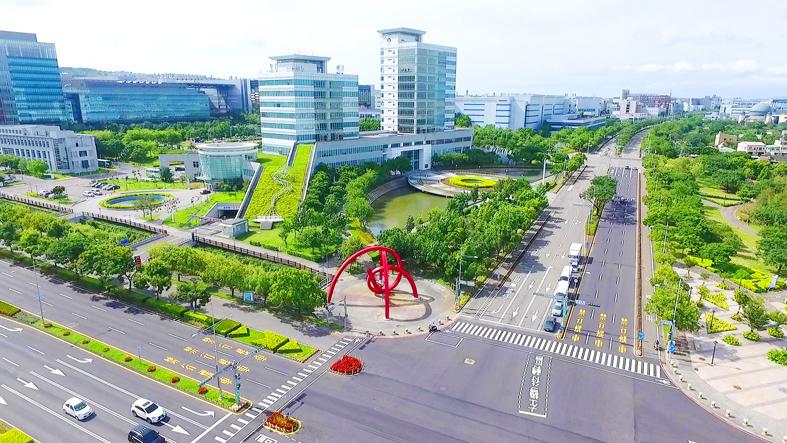Sales generated by the Central Taiwan Science Park (CTSP, 中部科學園區) in the first 10 months of the year hit a record NT$843.05 billion (US$30.28 billion), up 9.45 percent from NT$770.25 billion over the same period last year, the CTSP Bureau said.
The science park is home to many tech heavyweights from a wide range of sectors, including semiconductors, precision machinery, biotech, optoelectronics and renewable energy.
The park’s semiconductor firms posted NT$649.71 billion in combined sales over the 10-month period, up 4.68 percent from a year earlier and accounting for 77.07 percent of the park’s total sales, the bureau said last week.

Photo courtesy of the Central Taiwan Science Park Bureau via CNA
Taiwan Semiconductor Manufacturing Co (台積電), the world’s largest contract chipmaker, operates a 12-inch wafer fab in the science park, producing chips made using the company’s advanced process technology.
The semiconductor industry has benefited from growing demand for emerging technologies, such as applications for 5G and artificial intelligence, high-performance computing devices and automotive electronics, the bureau said.
Optoelectronics firms posted NT$155.35 billion in combined sales, soaring 30.37 percent from a year earlier and making up 18.43 percent of its total sales, the bureau said.
The companies benefited from a booming stay-at-home economy that has led to increased demand for devices used in remote working and distance learning, the bureau said, adding that the commercial use of mini-LED technologies helped boost sales in the optoelectronics sector.
Precision machinery makers posted NT$24.64 billion in combined sales, up 23.95 percent from a year earlier and accounting for 2.92 percent of the park’s sales.
Biotech firms posted NT$6.36 billion in sales, up 16.94 percent from a year earlier, while computer and peripheral producers generated NT$3.97 billion in sales, up 51.66 percent year-on-year.

TAKING STOCK: A Taiwanese cookware firm in Vietnam urged customers to assess inventory or place orders early so shipments can reach the US while tariffs are paused Taiwanese businesses in Vietnam are exploring alternatives after the White House imposed a 46 percent import duty on Vietnamese goods, following US President Donald Trump’s announcement of “reciprocal” tariffs on the US’ trading partners. Lo Shih-liang (羅世良), chairman of Brico Industry Co (裕茂工業), a Taiwanese company that manufactures cast iron cookware and stove components in Vietnam, said that more than 40 percent of his business was tied to the US market, describing the constant US policy shifts as an emotional roller coaster. “I work during the day and stay up all night watching the news. I’ve been following US news until 3am

UNCERTAINTY: Innolux activated a stringent supply chain management mechanism, as it did during the COVID-19 pandemic, to ensure optimal inventory levels for customers Flat-panel display makers AUO Corp (友達) and Innolux Corp (群創) yesterday said that about 12 to 20 percent of their display business is at risk of potential US tariffs and that they would relocate production or shipment destinations to mitigate the levies’ effects. US tariffs would have a direct impact of US$200 million on AUO’s revenue, company chairman Paul Peng (彭雙浪) told reporters on the sidelines of the Touch Taiwan trade show in Taipei yesterday. That would make up about 12 percent of the company’s overall revenue. To cope with the tariff uncertainty, AUO plans to allocate its production to manufacturing facilities in

Six years ago, LVMH’s billionaire CEO Bernard Arnault and US President Donald Trump cut the blue ribbon on a factory in rural Texas that would make designer handbags for Louis Vuitton, one of the world’s best-known luxury brands. However, since the high-profile opening, the factory has faced a host of problems limiting production, 11 former Louis Vuitton employees said. The site has consistently ranked among the worst-performing for Louis Vuitton globally, “significantly” underperforming other facilities, said three former Louis Vuitton workers and a senior industry source, who cited internal rankings shared with staff. The plant’s problems — which have not

COLLABORATION: Given Taiwan’s key position in global supply chains, the US firm is discussing strategies with local partners and clients to deal with global uncertainties Advanced Micro Devices Inc (AMD) yesterday said it is meeting with local ecosystem partners, including Taiwan Semiconductor Manufacturing Co (TSMC, 台積電), to discuss strategies, including long-term manufacturing, to navigate uncertainties such as US tariffs, as Taiwan occupies an important position in global supply chains. AMD chief executive officer Lisa Su (蘇姿丰) told reporters that Taiwan is an important part of the chip designer’s ecosystem and she is discussing with partners and customers in Taiwan to forge strong collaborations on different areas during this critical period. AMD has just become the first artificial-intelligence (AI) server chip customer of TSMC to utilize its advanced